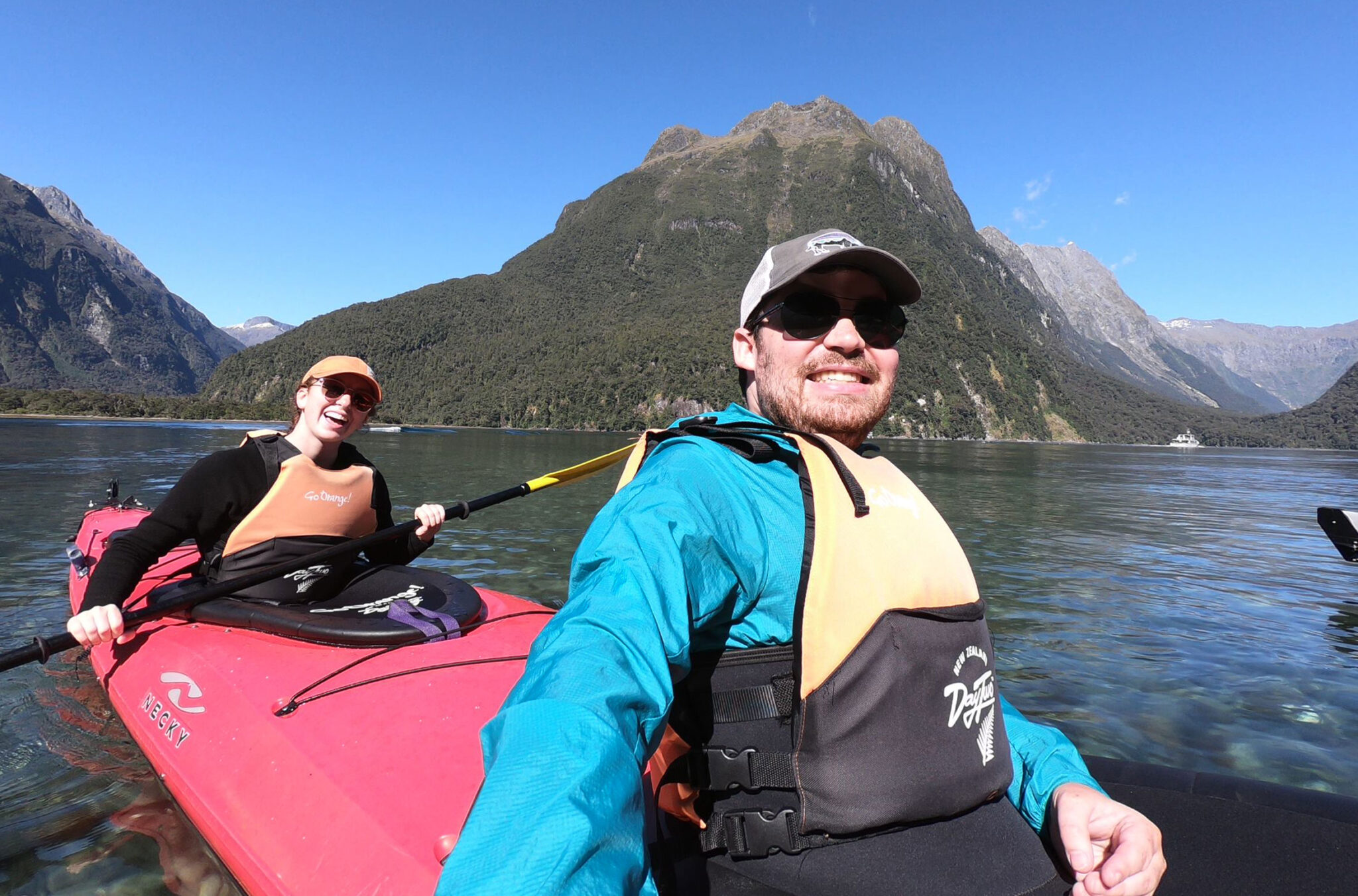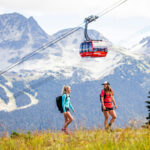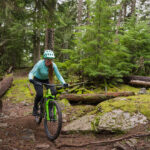I’ve spent a lot of my life around water. Growing up, my parents were avid water skiers, and my first official “job” was holding up the little orange flag when one of them was in the water. I was born with Becker Muscular Dystrophy, a degenerative neuromuscular disorder that affects my ability to grow and maintain muscle mass.
I have a disability, and it’s a core part of who I am and the path my life has taken. That’s not the case for everyone – identity is deeply personal. But I say this to recognize that disability is part of the human experience. We all perceive and are affected by it differently.
Throughout my youth, I wasn’t sure what I wanted, or what path I wanted my life to take, and often only felt loss or grief for each thing I felt like I was no longer able to do. I remember distinctly what it felt like to no longer be able to ski – at the time, it felt very final.
My brother volunteered for an adaptive skiing organization, then called Ski for All, in the Seattle area when I was younger. I can only assume this was a gentle push from my family for me to explore it again. Juggling disability and identity issues, feeling simultaneously “too” and “not enough” disabled, I stubbornly never wanted to try.
When I finally did, I fell in love with adaptive skiing and how it helped me reclaim my early love and appreciation for mountains. Since then, I’ve wanted to be outside constantly and find new ways to achieve that. One of those new ways was getting back on the water.
Creativity in Kayaking
Kayaking has always been such a peaceful thing to me, although to be clear, I’ve never tried whitewater kayaking. It’s quiet, offers some great views you don’t typically get, and you’re the only one in control. One of my favourite memories on the water was on a Boy Scout trip to Lopez Island in the San Juan Islands. I took a kayak out solo in the early evening and saw the colour of the water and sky change as the sun approached the horizon.
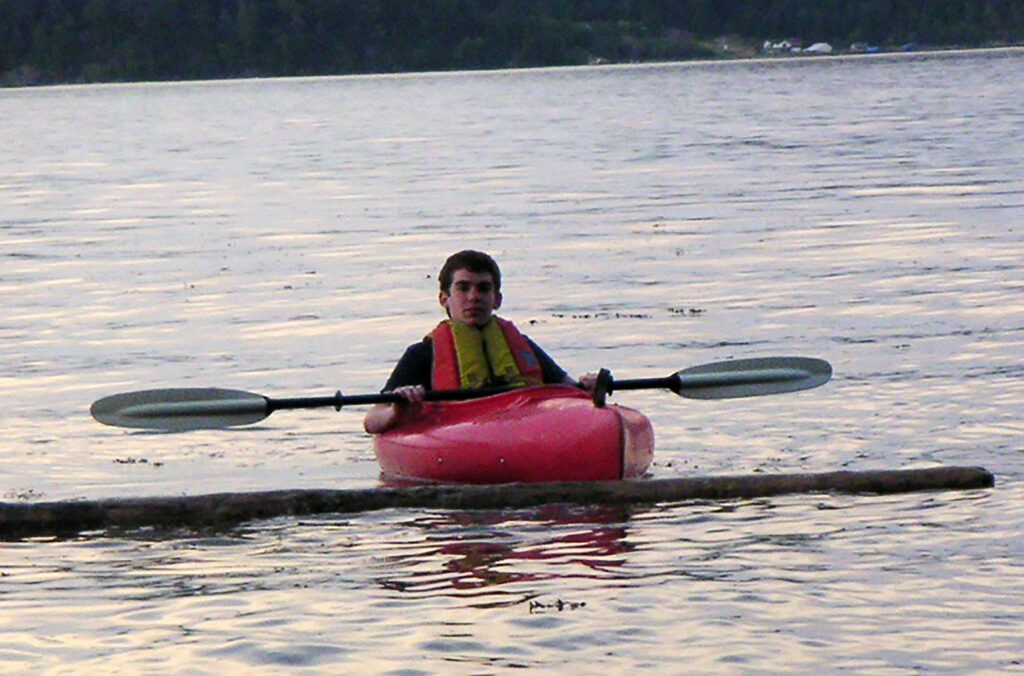
But it would be the last time I kayaked for a while. Even then, it had been tough to paddle as my strength changed. I had the same feeling as I’d had around skiing – that I’d done it for the “last” time, but in reality, I just hadn’t yet discovered the creativity to adapt and do it in the way that worked for me.
In 2018, I rented a tandem kayak on Lake Union in Seattle, and I tried it again. It wasn’t easy for me to paddle since the weight of the paddle made it difficult for me to hold it and paddle at the same time. Then, on a holiday to New Zealand in late 2018, I connected with a group called MakingTrax, which specializes in making traditional tourism activities more inclusive through training and creativity. Given the difficulty I had when I last paddled in a kayak, and being in a tandem kayak, I elected to be the passenger, and quickly fell into the role of official photographer and snack distributor.
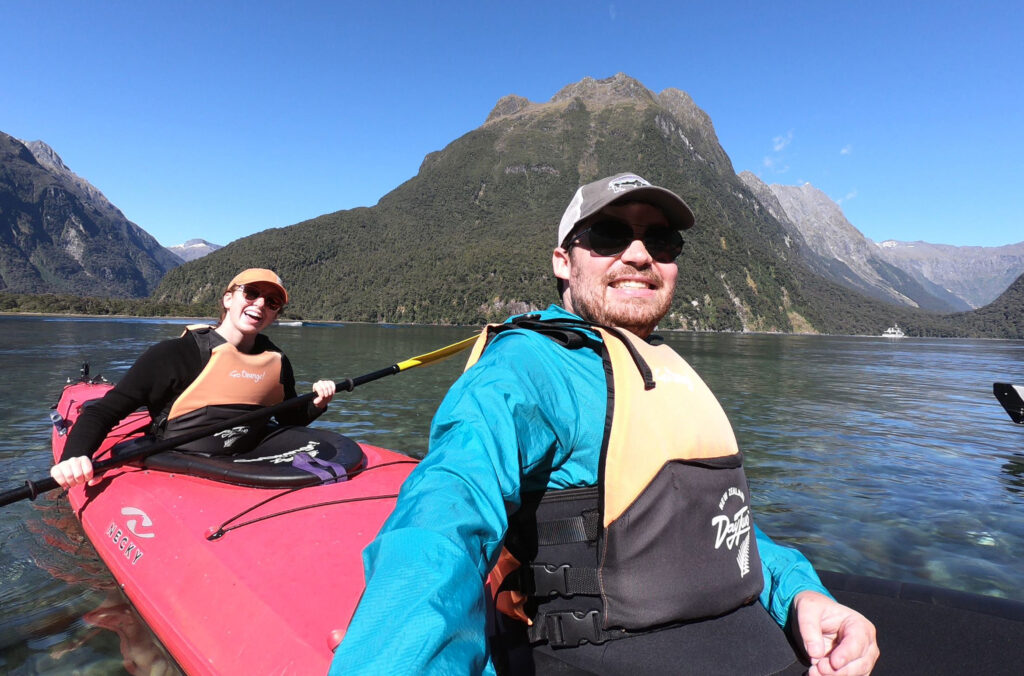
Being in that environment showed me that whichever way I adapt an activity, even as a passenger, my experience could be valid and profound. And that life is about actively seeking new adventures and finding things that bring you joy – these things don’t just happen.
I’ve learned from MakingTrax in New Zealand that adaptive organizations aren’t the only option. Traditional tourism groups can also be incredible to adventure with – it just takes some training, creativity and above all, the want to try.
Whistler Adaptive Sports
The next life-changing experience I had in a kayak was with Whistler Adaptive Sports (WAS) in August 2023. WAS uses kayaks that are specifically adapted to support people with disabilities. The kayak I tried had an articulating mount that held the paddle – I no longer had to manage the weight of the paddle and could focus instead on the paddling motion. The kayak also had additional pontoons for stability.
View this post on Instagram
I wasn’t going fast and still got towed quite a bit by the lead instructor, Don, but it was incredible to have agency over my own experience. For the first time in over a decade, I discovered the tools I needed to make kayaking work.
“Our starting point is always how to…with a focus on ability and what is possible,” explains Lead WAS Coach Adría Flor. “We find ways to move beyond someone’s immediate limitations to support that person in realizing a new experience or progress in their chosen sport and develop movement-based skills.
We work creatively with equipment and our approach to instruction to devise ways to open access to sport. Our group sessions provide a space for shared experiences and making new connections to build community. In addition to our group paddles, we offer one-on-one private coaching, weekly seasonal programs (all available to locals at a reduced rate) and drop-ins for anyone visiting the Sea to Sky.”
WAS has a variety of boats to suit different needs, including kayaks with outriggers for extra stability and an E Z dock for easy launch and recovery of kayaks and canoes. I’ve found staff and volunteers to be so excited about getting more people out on the water, and that mindset, paired with the tools available, means everyone can have a great time out on the water with WAS.
Find Your Connection to Adaptive Sports
Spending time on the water is always an incredible way to see things from a different perspective and enjoy the stillness and quiet. It helps that WAS group kayaking events are always a good time – everyone gets to share the joy of being on the water in the way that works for them. And, on a hot day, a well-timed splash always helps!
View this post on Instagram
Each time I try an adaptive sport, I find new tweaks and equipment to try. Even sports where I’ve had a lot more experience, like skiing and now kayaking, evolve with me as my body changes. If you’re planning your next holiday and looking for a community that wants to share its joy and creativity in accessing the outdoors, Whistler is it!
I hope these glimpses into my adaptive sports adventures and the ways they have enriched my life help show what’s possible. Your experience may look different – we know disability is different for everybody, but I’d encourage everyone to explore their intrinsic curiosity and see what Whistler has to offer.
Save up to 20% on lodging with Whistler.com this summer. Stay & Golf from $289 CAD per person, per night or Stay & Bike from $179 CAD per person, per night. Sign up to be a Rewards Member (for BC and WA residents only) and receive a FREE $50 CAD activity voucher on stays of 3+ nights.
You can also win a summer trip to Whistler with the Escape the Ordinary contest!
